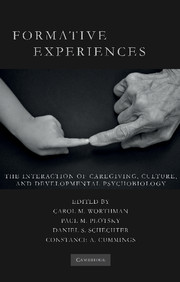Book contents
- Frontmatter
- Contents
- List of Figures
- List of Tables
- List of Contributors
- Foreword by Robert Sapolsky
- Preface
- List of Abbreviations
- Introduction
- SECTION ONE HISTORICAL, CROSS-CULTURAL, AND DEVELOPMENTAL SCIENCE PERSPECTIVES
- SECTION TWO HOW EXPERIENCE INTERACTS WITH BIOLOGICAL DEVELOPMENT
- SECTION THREE FORMATIVE RELATIONSHIPS WITHIN AND ACROSS GENERATIONS
- SECTION FOUR SOCIAL AND CULTURAL CONTEXTS OF CHILDHOOD DEVELOPMENT – NORMATIVE SETTINGS, PRACTICES, AND CONSEQUENCES
- SECTION FIVE FEAR, FUN, AND THE BOUNDARIES OF SOCIAL EXPERIENCE
- SECTION SIX PUBLIC HEALTH, EDUCATION, AND POLICY IMPLICATIONS
- Index
Preface
Published online by Cambridge University Press: 26 May 2010
- Frontmatter
- Contents
- List of Figures
- List of Tables
- List of Contributors
- Foreword by Robert Sapolsky
- Preface
- List of Abbreviations
- Introduction
- SECTION ONE HISTORICAL, CROSS-CULTURAL, AND DEVELOPMENTAL SCIENCE PERSPECTIVES
- SECTION TWO HOW EXPERIENCE INTERACTS WITH BIOLOGICAL DEVELOPMENT
- SECTION THREE FORMATIVE RELATIONSHIPS WITHIN AND ACROSS GENERATIONS
- SECTION FOUR SOCIAL AND CULTURAL CONTEXTS OF CHILDHOOD DEVELOPMENT – NORMATIVE SETTINGS, PRACTICES, AND CONSEQUENCES
- SECTION FIVE FEAR, FUN, AND THE BOUNDARIES OF SOCIAL EXPERIENCE
- SECTION SIX PUBLIC HEALTH, EDUCATION, AND POLICY IMPLICATIONS
- Index
Summary
The genesis of this book about development itself has been a developmental process. The structure as well as the source of some of the material derive from a conference held in 2005, entitled “Four Dimensions of Childhood: Brain, Mind, Culture, and Time.” Organized and funded by the nonprofit The Foundation for Psychocultural Research (FPR), the meeting was co-sponsored by the University of California, Los Angeles, and The Eunice Kennedy Shriver National Institute of Child Health and Human Development (NICHD, R13HD048149). The conference itself was the product of the vision of FPR founder Robert Lemelson, of discussions by members of the foundation board, and of creative and energetic foundation staff.
The intellectual highlights of the conference drove decisions about formation of the volume. First, we found that the initial focus on advances in developmental neuroscience required expansion to include the equally compelling breakthroughs in epigenetics, genomics, neuroendocrine regulation, and behavioral and social biology. Second, we observed that the interaction among scientists and practitioners around specific cases or findings were particularly revealing. Several sessions at the meeting were organized as case studies, which were then discussed in depth by a panel of researchers from different fields. We found that the diversity of contexts, observations, and perspectives – even within academic disciplines – contributed to a richer understanding of early life experience and its defining moments. Consequently, we set out to identify a complementary set of case studies or research vignettes and then elicited commentary from key thinkers in other fields.
Information
- Type
- Chapter
- Information
- Formative ExperiencesThe Interaction of Caregiving, Culture, and Developmental Psychobiology, pp. xxvii - xxxPublisher: Cambridge University PressPrint publication year: 2010
